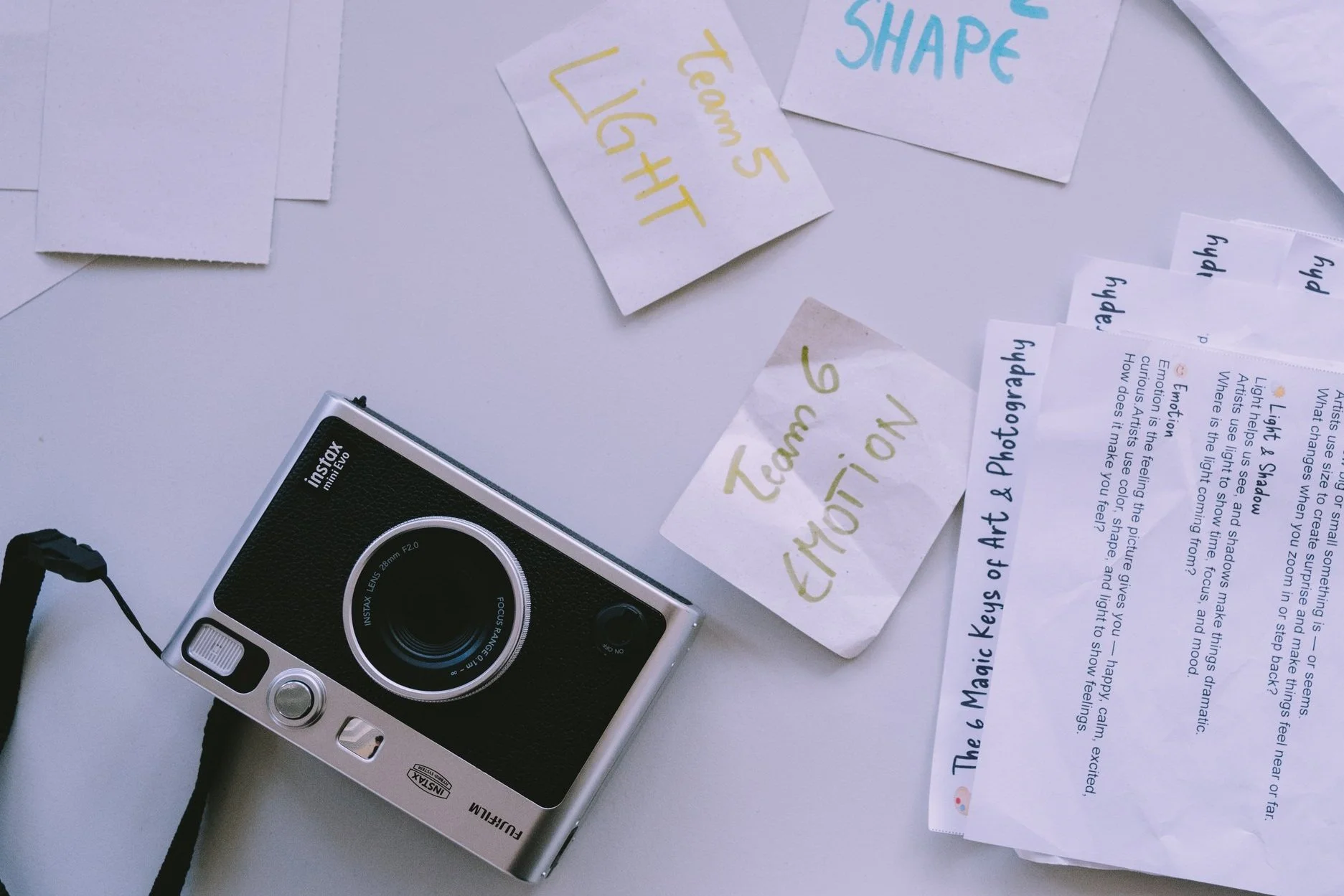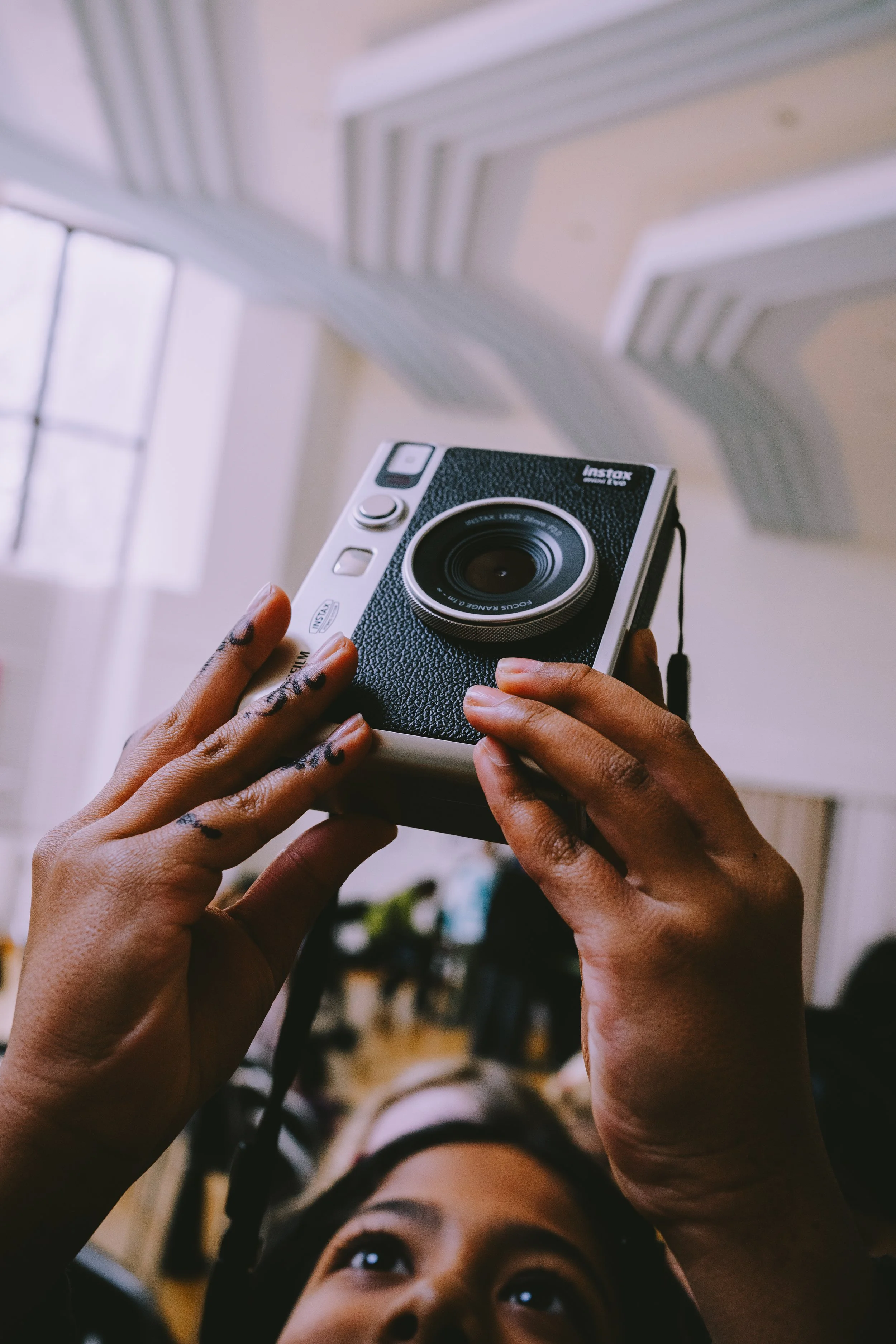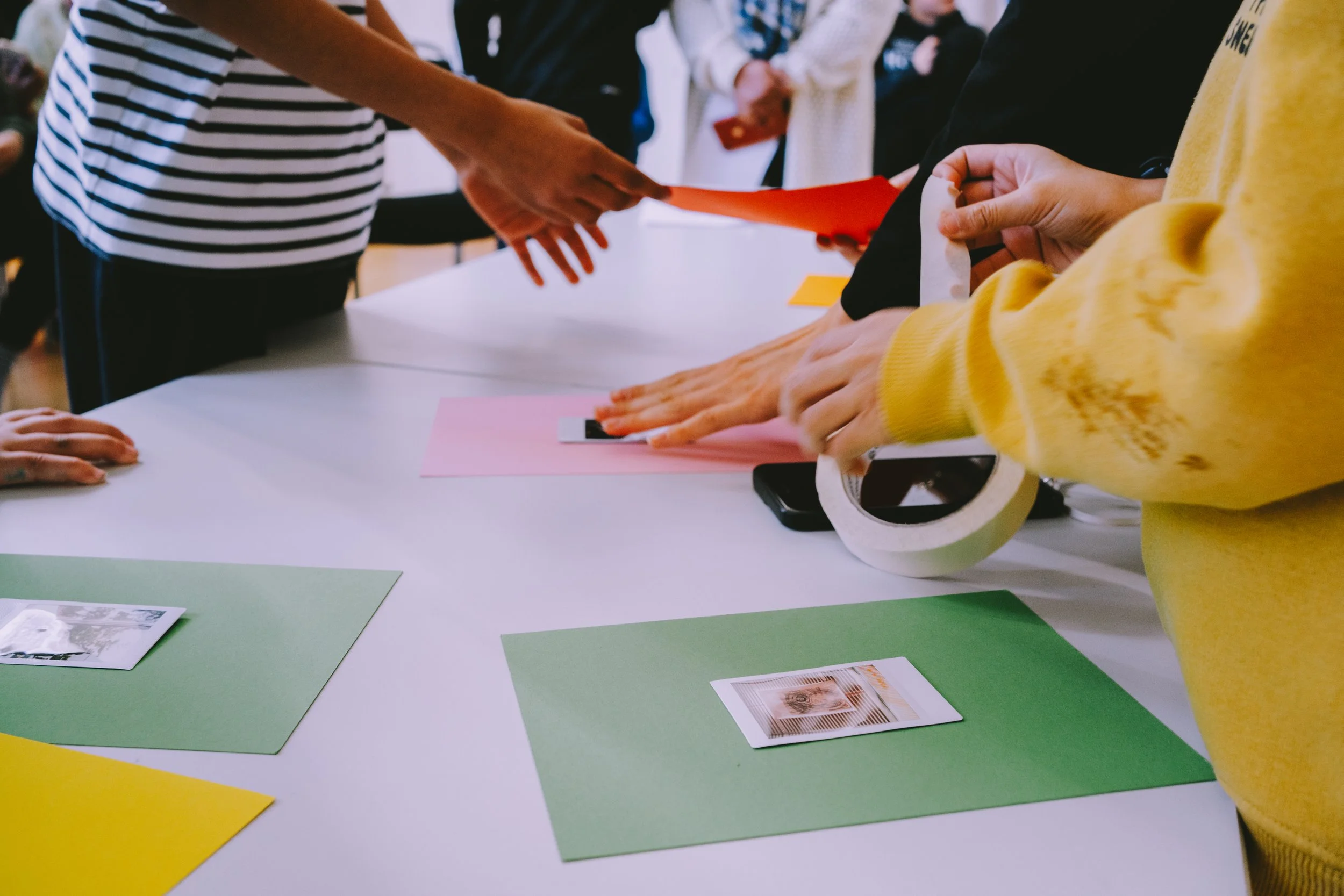How Photography Enhances Learning for Kids: A Creative Workshop at Ressu Comprehensive School in Helsinki
Why Photography for Kids?
In today's world, it's disheartening to see many children walking around with their heads down, absorbed in their phones. In case you did not hear yet, extensive research indicates that excessive screen time can lead to decreased social coping skills and emotional regulation issues in children PMC. Additionally, studies have shown that children who spend more than three hours per day on social media face nearly double the risk of mental health challenges, including symptoms of depression and anxiety The Baker Center. This shift in behavior and kids’ curiosity in using digital technology is impacting the way kids engage with their surroundings and peers.
I designed a digital photography workshop for a 3rd grade class in Helsinki and welcomed the kids into an art exhibition to play and learn
After facilitating several photography-related workshops and courses for adults, I saw first-hand the profound impact photography can have on the mind. Participants from various professional and cultural backgrounds shared with me how photography helped them regain focus, cultivate mindfulness, and tap into their creativity. Many also spoke about how the process of exploring their own lives through the lens rekindled a sense of hope, allowing them to see their world from a new perspective. Hearing these powerful stories made me wonder:
Could photography have the same impact on younger generations? What if photography can enhance the quality of learning for kids?
This question was further sparked by a personal experience I had with my 10-year-old cousin during a hiking trip in the Carpathian Mountains in Romania. When I handed her my camera to explore the beauty around us, I was amazed at how it ignited her curiosity and took the boredom away. She started playing in the forest, moving more, noticing the little details—things she might not have paid attention to otherwise. That moment (I also made a video about this on social media) confirmed to me that digital photography can be turned into a great learning tool for kids nowadays in our digitised world.
In this article, you'll discover how photography can help children develop healthier ways of playing and more interactive ways of learning. During my Creative Harmony workshop with 45 kids from Ressu Comprehensive School in Helsinki, I guided them through a series of engaging photo games designed to help them appreciate art and understand why art museums exist.
In this workshop, children worked collaboratively in teams, engaging with easy-to-read educational materials on visual communication. The hands-on approach allowed them to learn together, fostering teamwork and creative thinking while gaining valuable insights into the art of visual storytelling
Supported by the HIAA (Helsinki International Artists Association) and in collaboration with Merirasti Culture Space in Helsinki, this workshop became a powerful catalyst for connection, self-expression, and creative discovery. Thanks to the support of our amazing collaborators, the transformative power of photography was shared with 45 diverse 10-year-old children from various nationalities, fostering a rich environment of exploration and growth.
Photography = Accessible, Practical, and Fun
One reason kids love to play with photography is that it’s both practical and easily accessible. In today’s world, almost every child has access to a phone, making photography a fun and engaging way to learn and engage in more healthier practices while inevitably using today’s technology. The simplicity of using a phone camera allows children to quickly capture moments, explore their surroundings, and experiment with composition—all without the need for expensive equipment. This easy accessibility encourages children to dive into their creativity without hesitation, empowering them to express themselves in an immediate and hands-on way.
By manipulating concrete materials in particular ways, abstract concepts are discovered. This learning process, rooted in observation, is at the heart of how children develop understanding" — Lillard, A. S. (2017), Montessori: The Science Behind the Genius
Each kid had the opportunity to experiment with both phone photography and a point-and-shoot digital camera. This gave them the chance to explore different ways of capturing images and brought an extra layer of creativity to their experience.
Photography Helps Kids Pay Attention and Be Present
We all know how much energy kids have—and how much they need to move and explore. That’s exactly why photography can be such a perfect fit. It lets children stay active while engaging their senses and imagination. One of the magical things about photography is how it encourages kids to really look at the world around them. Instead of just rushing through their day, they start paying attention to details they might have missed before—like the way light falls on a leaf or the texture of a rock.
By focusing on what to capture, children begin to develop a deeper appreciation for the little things in life. This simple act of noticing, combined with the process of framing a shot, helps them sharpen their observational skills and grow more mindful of their surroundings. It’s not just about taking a picture—it’s about being present in the moment and seeing the beauty in everyday life, all while staying curious and on the move.
Photography Brings Kids Together and Builds Teamwork
Photography isn’t just about the individual experience; it’s a great way for kids to work together, too. In my photo-workshops, children get to team up, share ideas, and collaborate on their shots. Whether they're deciding which scene to capture or how to use light and angles creatively, they learn to communicate and listen to each other. This shared experience helps strengthen social bonds and teaches them how to express their thoughts and work towards a common goal. Working with others also boosts their confidence and gives them the chance to see things from different perspectives, making them feel more connected and supported by their peers.
Children and their teachers collaborating for their mini photography showcase
Nurturing Curiosity Through the Lens with Educators, Caregivers and Social Workers
Photography offers so much more than just pretty pictures—it’s a playful, hands-on way for children to explore, observe, and express themselves. Whether they’re capturing light, colors, or the feeling a moment gives them, kids begin to see the world through a more thoughtful and creative lens. And the best part? It all feels like play. With just a phone or a simple digital camera, they get to move, notice, connect, and create—skills that will serve them far beyond the classroom or workshop setting.
As educators, caregivers, or social workers working with children, embracing photography as a learning tool can open new doors to emotional growth, teamwork, and self-confidence. So let’s encourage young minds to pick up a camera and see what unfolds—it might just change the way they see the world, and themselves.
Printed results taken by the kids during the workshop
Designed with Care: Why Structure Matters in Creative Learning
It is important to note that these photography workshops aren’t just spontaneous creative play—they are carefully designed experiences rooted in years of research and practice. Every prompt, every interaction, and the way we hold space for the children to explore on their own is thoughtfully crafted. It’s not about constant guidance, but about knowing when to step back and let their creativity flow freely. The photo games and exercises I use come from over 15 years of working with photography as a therapeutic tool, combined with focused research on this topic since 2017. That’s why it’s important to understand that not just anyone can facilitate this kind of experience—it requires a guide who can design activities through the lens of child psychology, therapeutic photography, and creative well-being. While the workshops are full of fun and play, they also hold a deep, intentional layer underneath—one that I’ve built with care, study, and a passion for helping others bring this meaningful method into their own work with children.
If you're looking for a creative and engaging learning experience, I'd love to hear from you. I offer photography workshops and courses—online, hybrid, or in-person—designed for schools, universities, NGOs, and cultural institutions. As a teacher, caregiver or social worker, you can contact me for different kinds of collaboration. Contact here.
#PhotographyForKids #CreativeLearning #ArtInEducation #VisualStorytelling #EmotionalLearning







